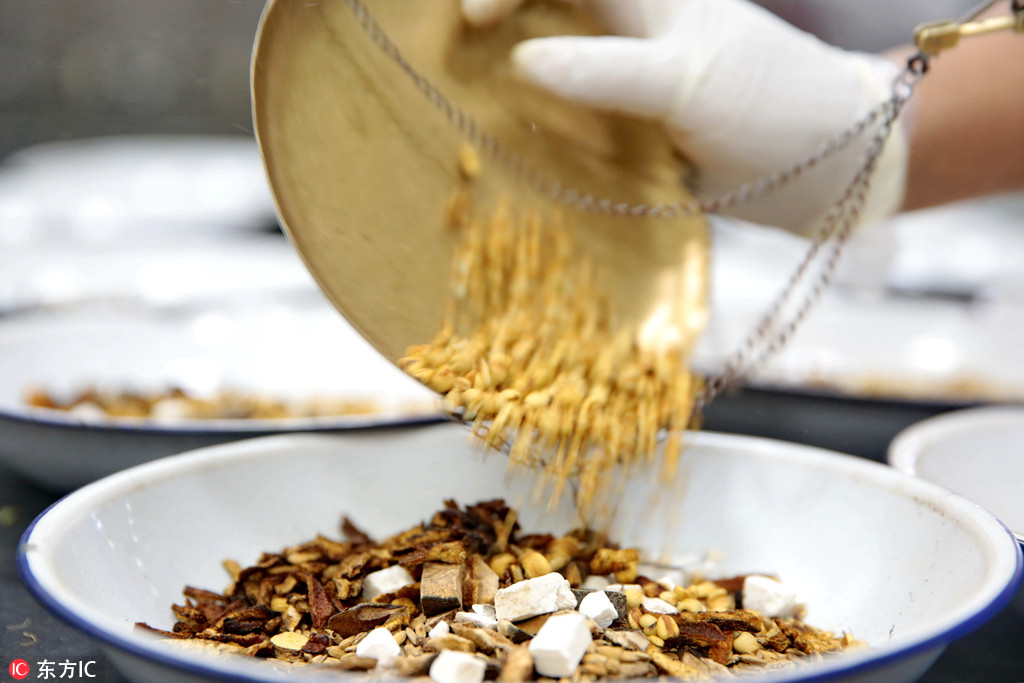TCM herbs may replace antibiotics to improve animal health


China has vowed to stop adding routine antibiotics to animal feed, starting in 2020, to reduce the ill effects of overuse, and some Chinese livestock companies are exploring the potential of traditional Chinese medicine to promote healthy development of animals.
Antibiotics have long been used to kill harmful bacteria in both animals and people. But the continued overuse of the drugs has led to the serious problem of resistance. The European Union decided in 2006 to eliminate antibiotic growth promoters from animal feed and China has announced that it will follow suit starting from next year.
The move is in line with the requirement of the 19th National Congress of the Communist Party of China held in October 2017, that China should "push green development" and "implement food security strategy to ensure people have access to safe food".
Statistics from the Chinese Academy of Sciences show that in 2013, China used more than 16 million tons of antibiotic products, and half are used for animals, leading to the release of 5 million tons of antibiotic residues into water and soil.
"The State will no longer allow the use of antibiotic growth promoters next year and what we can do is improve the immune systems of animals in a more healthy manner," said Zhang Jing, an animal science professor of Jilin University.
To that end, some provinces, such as Jilin, Liaoning and Guangdong, have formed industry associations to promote use of feed free of antibiotics.
Meanwhile, to solve the problem of disease prevention and treatment, some researchers and enterprises are experimenting with using traditional Chinese medicine to meet the requirements not to use antibiotics.
"Many livestock farms and enterprises want to find products to promote animal growth without antibiotics, but it is a challenging task," said Du Yunsheng, head of the Kangfa Animal Drug Institute in Changchun, capital of Jilin.
"We have been experimenting with TCM to improve the immune capability of animals and prevent and cure animal diseases for 15 years and have achieved satisfactory results," said Du.
Du said he became a veterinarian in 1993 after graduating from an agricultural school, and at that time, antibiotics were widely used.
"I felt that antibiotics had been overused and had become harmful, and therefore I began thinking about ways to replace them," he told China Daily.
He later formed a research institute for companies testing and promoting the use of TCM in animal treatment.
By 2016, Du had developed 10 corporate standards and 11 patents on use of TCM in raising livestock.
"National standards are yet to be established in this respect," Du said.
The local government has also selected 40 pig raising farms with more than 10,000 sows to promote his TCM-based solution.
Du's solution mainly involves the combination of different TCM herbs in accordance with different growth stages of the animals.
"We conducted experiments on tens of thousands of pigs, chickens and other animals over a period of 15 years," he said.
Correctly used, TCM herbs are effective and quick in curing diseases and promoting growth of animals."
The use of TCM herbs can reduce stress and inflammatory response, increase feed intake and weight, reduce mortality, and increase feed conversion, he said.
The cost of TCM herbs is the main bottleneck for many livestock farmers and enterprises that want to use them to replace antibiotics. But Du said costs are high due to incorrect selection of herbs.
"There are numerous herbs in nature and many of them can work to solve the same problem; so we can select herbs that are seldomly used to treat people to form our low-cost herb combinations," he said.
Since those types of herbs are not used to treat people, generally they are not in tight demand and are therefore not expensive, he explained. "Actually, the herbs we use are cheap and will not increase costs for livestock farmers much."
Through improving the immune systems of animals, TCM herbs may hopefully provide some clue for preventing and curing the spread of the African swine fever virus, he said. "Research should be conducted to find out whether TCM herbs can play a role."




































